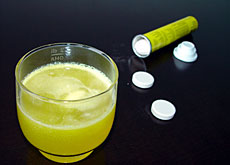
Price fixers face hefty fines under new cartel law

Switzerland’s new cartel law, which comes into force on April 1, gives the authorities increased powers to punish breaches of competition rules.
Price rigging between manufacturers costs the Swiss economy billions of francs and is one of the main reasons for the country’s lacklustre growth.
The International Monetary Fund (IMF) and the Organization for Economic Cooperation and Development (OECD) have been calling on the Swiss to take action against cartels for years.
At its annual press conference on Tuesday, Switzerland’s Competition Commission said the new law was a “strong” measure which would help crack down on cartels.
“We will be able to sanction companies which abuse their dominant position,” the commission said in a statement.
According to latest reports by the IMF and OECD, Switzerland’s gross domestic product could grow by an extra 0.5-0.8 per cent a year if the necessary measures were adopted to boost competition and eliminate cartels.
This represents around SFr2-3.5 billion ($1.6-2.7 billion) lost every year.
First to benefit would be Swiss consumers who pay on average a third more for consumer goods than their European Union neighbours.
Switzerland lagging behind
Efforts in Switzerland to liberalise markets have foundered in the past on a lack of political will.
While the Left has fought against any weakening of state-owned enterprises, the Right has blocked any restriction of the private sector.
It was only around a decade ago that the government drew up legislation to tackle cartels. But the 1996 law lacked the teeth to break unlawful agreements.
Since the law’s introduction, the Competition Commission (Comco) has failed to impose a single penalty – despite conducting dozens of investigations in recent years.
“So far, in practice, every first offence has gone unpunished,” admits Comco director Rolf Dähler. “We have only been able to impose punishments for repeat offences.”
The ineffectiveness of Swiss legislation was illustrated by the vitamin cartel case in 2001. Switzerland’s Roche and other global pharmaceutical giants were found guilty of rigging the prices of their vitamin-based products from 1990 to 1999.
Roche was ordered to pay fines of $500 million in the United States and €462 million in the European Union. But in Switzerland, the Basel-based firm was not fined a single franc.
“The vitamin cartel was probably the case which persuaded business and political circles that they had to act and impose stricter regulations,” says Dähler.
European standards
As of April 1, the revised cartel law will give Switzerland more effective instruments in line with those of other industrialised nations.
Direct sanctions now exist for first offences. Fines are no longer nominal and may amount to as much as ten per cent of turnover in Switzerland over the preceding three years.
In future, “vertical agreements” – when producers make exclusive deals with wholesalers or retailers, imposing a minimum selling price – will be punished.
Secret price-rigging deals between market-dominant competitors – known as “horizontal agreements” – are already banned.
Since it is extremely difficult to break the wall of silence surrounding secret agreements, the new statutory instrument promotes the use of whistleblowers.
Companies which report a cartel and cooperate with the authorities may be granted a reduction or even cancellation of their own fines.
It is a model which has already worked well in the European Union and the US, where reporting of cartels has risen tenfold in recent years.
Cautious optimism
Having long held considerable reservations, the business community finally accepted the revision of the cartel law.
“The new statutory provisions aren’t going to work miracles, but will certainly lead to a fall in prices in Switzerland and boost competition,” claims Rudolf Walser, chief economist at the Swiss Business Federation, economiesuisse.
According to economiesuisse, the government should also do more to strengthen competition by liberalising sectors still dominated by monopolies or protectionism, such as the electricity market, the postal sector and agricultural production.
“It would be a step in the right direction, because Switzerland is a high-price stronghold,” says Jacqueline Bachmann, director of the Foundation for Consumer Protection.
“But producers have every interest in keeping prices high. They are sure to continue trying to find all the cleverest excuses to dispose of their products at inflated prices in the future”.
swissinfo, Armando Mombelli
The cartel law came into force on July 1, 1996.
A revised cartel law comes into force on April 1.
The new statutory provisions include tougher punishments for companies found guilty of price rigging.
Offences are punishable by fines of up to 10% of the preceding three years’ turnover.
Consumer prices in Switzerland are 30-40% higher than in EU member states.
The Swiss spend around SFr7 billion a year on business with neighbouring countries.
Cartels and other restraints of competition cost the Swiss economy an estimated SFr2–3.5 billion a year.

In compliance with the JTI standards
More: SWI swissinfo.ch certified by the Journalism Trust Initiative






























You can find an overview of ongoing debates with our journalists here . Please join us!
If you want to start a conversation about a topic raised in this article or want to report factual errors, email us at english@swissinfo.ch.